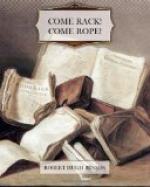Robin heard the third mass, said by Mr. Ludlam, from a corner near the door; and this one, too, was a fresh experience. The former priest had resembled a strong man subdued by grace; the second, a weak man ennobled by it. Mr. Ludlam was a delicate soul, smiling often, as has been said, and speaking little—“a mild man,” said the countryfolk. Yet, at the altar there was no weakness in him; he was as a keen, sharp blade, fitted as a heavy knife cannot be, for fine and peculiar work. His father had been a yeoman, as had the other’s; yet there must have been some unusual strain of blood in him, so deft and gentle he was—more at his ease here at God’s Table than at the table of any man.... So he, too, finished his mass, and began to unvest....
Then, with a noise as brutal as a blasphemy, there came a thunder of footsteps on the stairs; and a man burst into the room, with glaring eyes and rough gestures.
“There is a company of men coming up from the valley,” he cried; “and another over the moor.... And it is my lord Shrewsbury’s livery.”
III
In an instant all was in confusion; and the peace had fled. Mr. John was gone; and his voice could be heard on the open stairs outside speaking rapidly in sharp, low whispers to the men gathered beneath; and, meanwhile, three or four servants, two men and a couple of maids, previously drilled in their duties, were at the altar, on which Mr. Ludlam had but that moment laid down his amice. The three priests stood together waiting, fearing to hinder or to add to the bustle. A low wailing rose from outside the door; and Robin looked from it to see if there were anything he could do. But it was only a little country servant crouching on the tiny landing that united the two sets of stairs from the court, with her apron over her head: she must have been in the partitioned west end of the chapel to hear the mass. He said a word to her; and the next instant was pushed aside, as a man tore by bearing a great bundle of stuffs—vestments and the altar cloths. When he turned again, the chapel was become a common room once more: the chest stood bare, with a great bowl of flowers on it; the candlesticks were gone; and the maid was sweeping up the herbs.
“Come, gentlemen,” said a sharp voice at the door, “there is no time to lose.”
He went out with the two others behind, and followed Mr. John downstairs. Already the party of servants was dispersed to their stations; two or three to keep the doors, no doubt, and the rest back to kitchen work and the like, to give the impression that all was as usual.
The four went straight down into the hall, to find it empty, except for one man who stood by the fire-place. But a surprising change had taken place here. Instead of the solemn panelling, with the carved shield that covered the wall over the hearth, there was a great doorway opened, through which showed, not the bricks of the chimney-breast, but a black space large enough to admit a man.




